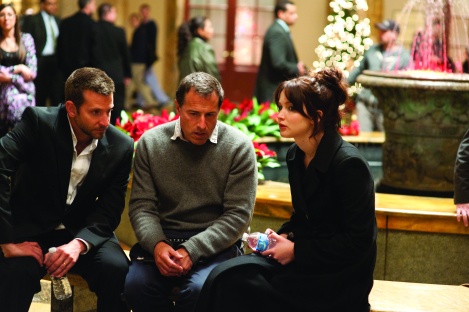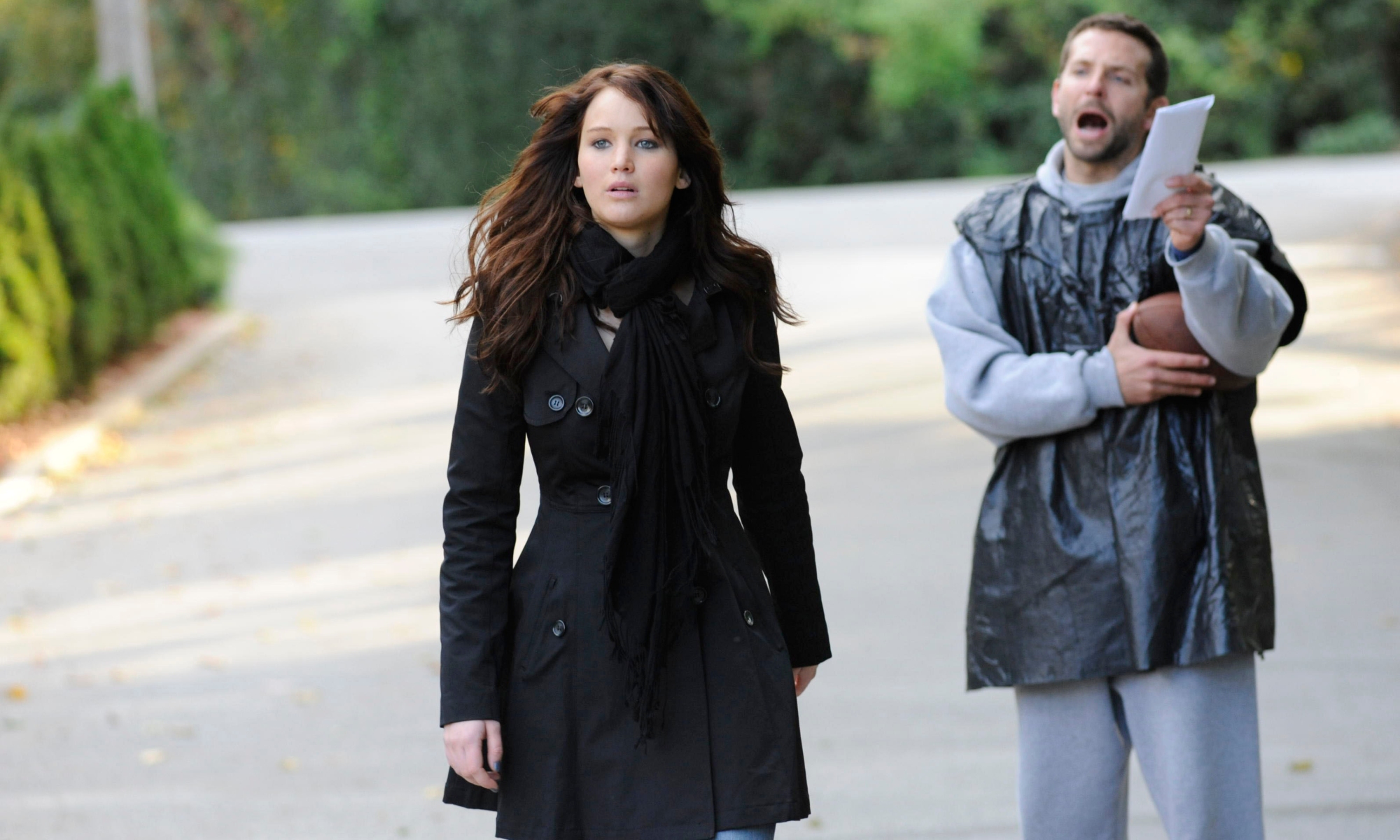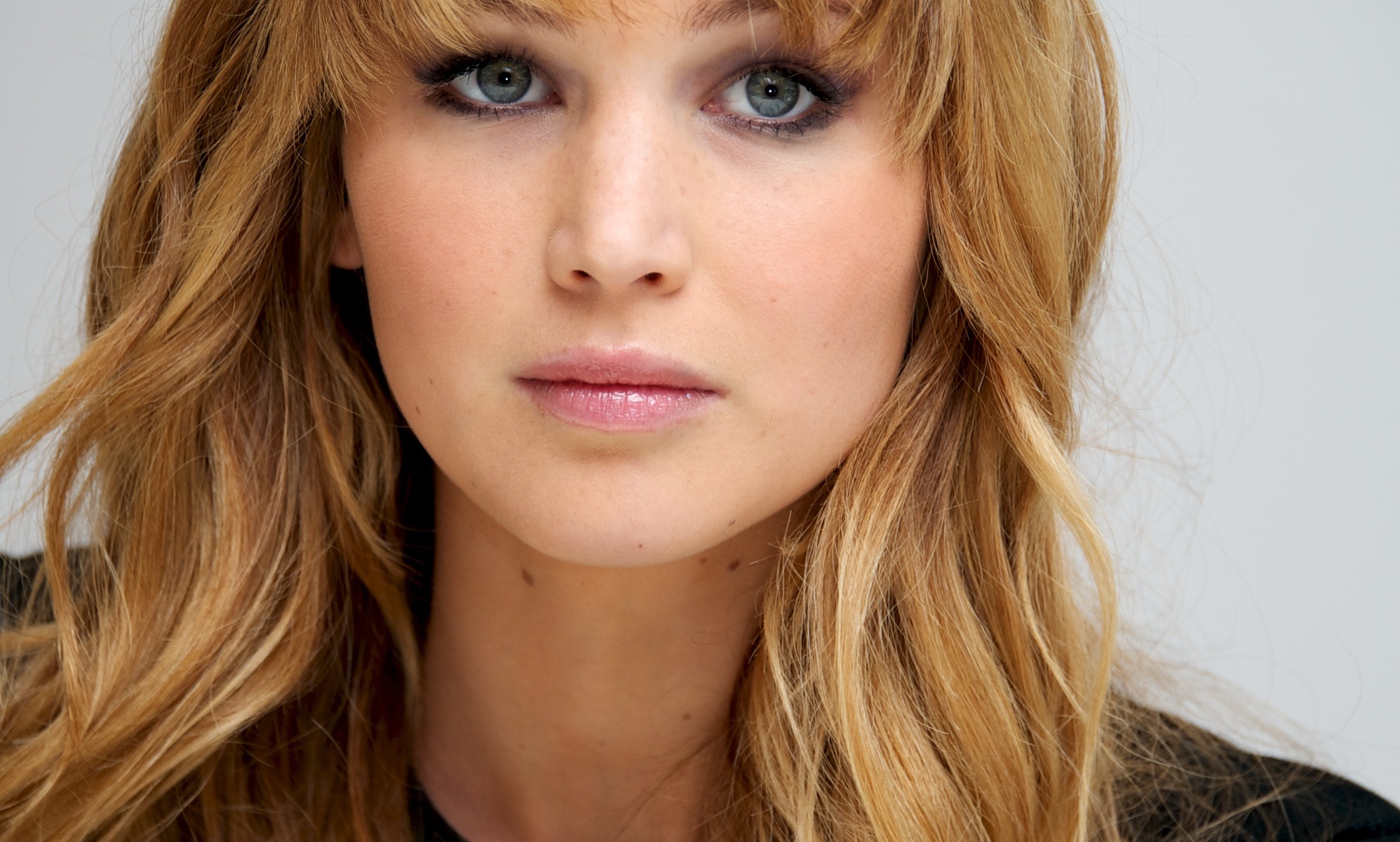Paul Brownfield is an AwardsLine contributor. This article appeared in the Dec. 12 issue of AwardsLine.
The least saleable aspect of David O. Russell’s Silver Linings Playbook is also one of its central themes: obsession.
Pat Solitano, the lead character played by Bradley Cooper, is bipolar and manically fixated on getting his estranged wife back. Pat’s father, played by Robert De Niro, is a would-be bookmaker whose OCD behaviors (and his love) get projected onto his gambling and his diehard devotion to the hometown Philadelphia Eagles.

As the film begins, Pat is being released from a psychiatric hospital and moving back into a kind of halfway house—his childhood bedroom. De Niro spends much of the film in Eagles green, trying not to notice his son’s psychosis, which involves long runs through his neighborhood wearing sweats and a trash bag, while Pat’s mother, played by Jacki Weaver, tiptoes through the minefield created by her husband and son.
This is, in other words, prime Russell territory. The setting of Silver Linings Playbook, a no-frills, middle-class neighborhood in Philadelphia, has echoes of Russell’s last film, The Fighter, which evoked working-class Lowell, MA.
Russell calls Silver Linings a cousin to the world of The Fighter. He shot both films on similar 33-day schedules. His budget on Silver Linings was a reported $21 million. Jon Gordon, one of the film’s producers, noted that Russell can even be heard in a few scenes.
“We got most of it out in the post process, but if you listen very, very closely, there’s still a couple places in the movie where you can hear David’s voice in the background,” Gordon says.

This fits Russell’s image as a director who himself wades into the emotional muck he means to bring out onscreen. The world of Silver Linings Playbook is not as hardened or volcanic as the world of The Fighter, though there are still verbal—and a few physical—punches thrown, including by Tiffany (Jennifer Lawrence), the widow of a cop with whom Pat forges a connection.
What resonated for Russell when he was adapting the novel by Matthew Quick, he says, was a personal connection to the relationship between a father with OCD and his bipolar son.
“I liked that it was a very specific world, and part of what makes it specific is that there’s a father-son and a mother-son relationship that I have personally experienced with my own son,” Russell says. “Mr. De Niro doesn’t like to talk about his personal motivation so much, but it was also personal to him.”
Not so long ago, the director of Flirting With Disaster and Three Kings was in a self-described “wilderness period.” He hadn’t completed a film since 2004’s existential comedy I Heart Huckabees. The film that changed Russell’s course, and made Silver Linings Playbook possible, was The Fighter. Russell was only a few months removed from the awards-season fanfare for that film when he began preproduction on Silver Linings, and he attacked the production in the way he made The Fighter: Lean below the line; lots of steady cam and hand-held camera; and “show up and do the best you can.”
The film’s pathway to the screen, in the words of the Weinstein Co.’s Donna Gigliotti, had “luck and serendipity on its side.” The novel had been optioned by Sydney Pollack and Anthony Minghella, producing partners who had a first-look deal with Weinstein. They in turn gave the book to Russell to adapt. At the time, his son was 13, and he had recently divorced.
“I needed to work, I needed to write something, and I needed to make a living. And I also really responded to the material, so it was a matter of having the tone right,” Russell says. “You had to not stop working on the tone all the way through the editing process. The key to the whole thing is to keep it real, is to keep the people’s emotions committed and real.”
Early in 2008, Pollack and Minghella passed away within a few months of each other. Michelle Raimo, another producer attached to Silver Linings, was named president of Sony Pictures Animation. The script was languishing, Gigliotti explains, until Raimo urged her not to let Silver Linings fall by the wayside.
At the time, Gigliotti was in the midst of an Oscar campaign for the Weinstein Co.’s The Reader. By then, Russell had gone on to make The Fighter, after which the writer/director was suddenly a hot commodity again. “And thus,” Gigliotti explains, “there was new life in the project.”
It is the kind of movie—part family drama, part romantic comedy, not easily reduced in a trailer—that doesn’t come out of Hollywood with regularity.
“Studios used to make movies like this, and they don’t anymore,” Gigliotti says. “They’ve simply ignored the films that are adult-oriented and in that wheelhouse of $20 million to $40 million.”
Asked about reports that Silver Linings was originally to have starred Mark Wahlberg and Anne Hathaway, Gigliotti says that by the time the film got off the ground, Wahlberg had a scheduling conflict with the action-thriller Contraband, and Hathaway had a commitment to the Batman movie The Dark Knight Rises.
In their stead came Bradley Cooper, best known for The Hangover franchise, and Jennifer Lawrence, Oscar-nominated for her performance in Winter’s Bone but not yet the Hunger Games star.
“It’s funny,” Lawrence says. “I had just worked with Gary (Ross) on Hunger Games, who worked in a completely different way from David, no better, no worse. I’m always slightly embarrassed, as I don’t have any kind of acting background. It’s a silly thing to say, but you work with actors who talk about different methods, and I never had that and it’s a worry of mine because I don’t know technically what I’m doing. Any moment I could show up on set and blow it. That was the first movie that I felt like it was an advantage, because I felt so open to working with—not so much an advantage, but a blessing—any kind of director. But it was so easy with him, I understood him.”
Particularly for Cooper, the film would require that he stretch himself as an actor.
“When I read the script—I think it was probably sort of my defense mechanism—I just sort of thought, ‘Ah, I’m not really right for this,’ which is kind of counterintuitive because I’m from Philly,” Cooper says. “I’m obsessed with the Eagles, I’m Italian-Irish, my parents grew up in households very similar to (Pat’s family), my grandparents lived like that. I grew up basically with my grandparents.”
Watching Cooper play the conceded groom in one of the actor’s early Hollywood roles, 2005’s Wedding Crashers, Russell saw a “palpably angry individual” otherwise being used to play a comedic heavy.
Sure enough, Russell says, Cooper told him he had been an angrier person then. “There were substances and a lot of vulnerable emotions that he was hiding behind anger,” Russell recounts. Inside of five minutes of their meeting, Russell thought Cooper was a “much more vulnerable and interesting person than I’ve seen him be in cinema.”
Russell drew other parallels between Cooper and the character he plays: Both lost weight by way of remaking themselves, and both were hungry to be reintroduced to their respective communities.
“The hunger of Bradley to do this role, the hunger to step up as an actor and to do whatever it took is a wonderful thing for a director, and it mirrors the character’s hunger to be reintroduced to his community. They’re both in a way being reintroduced.
“That’s why I was conscious of starting the film on Bradley’s back,” Russell continues, referring to the movie’s opening scene, in which the camera is trained on Cooper as he is about to leave the hospital. “It’s not the first time I feel I’ve been down that road, in the sense that I feel like people thought they had a reductive idea of Amy Adams. When I told them she was playing a very tough, strong, sexy bitch in The Fighter, people were extremely skeptical. And I said, ‘Well, see the movie.’ ”






